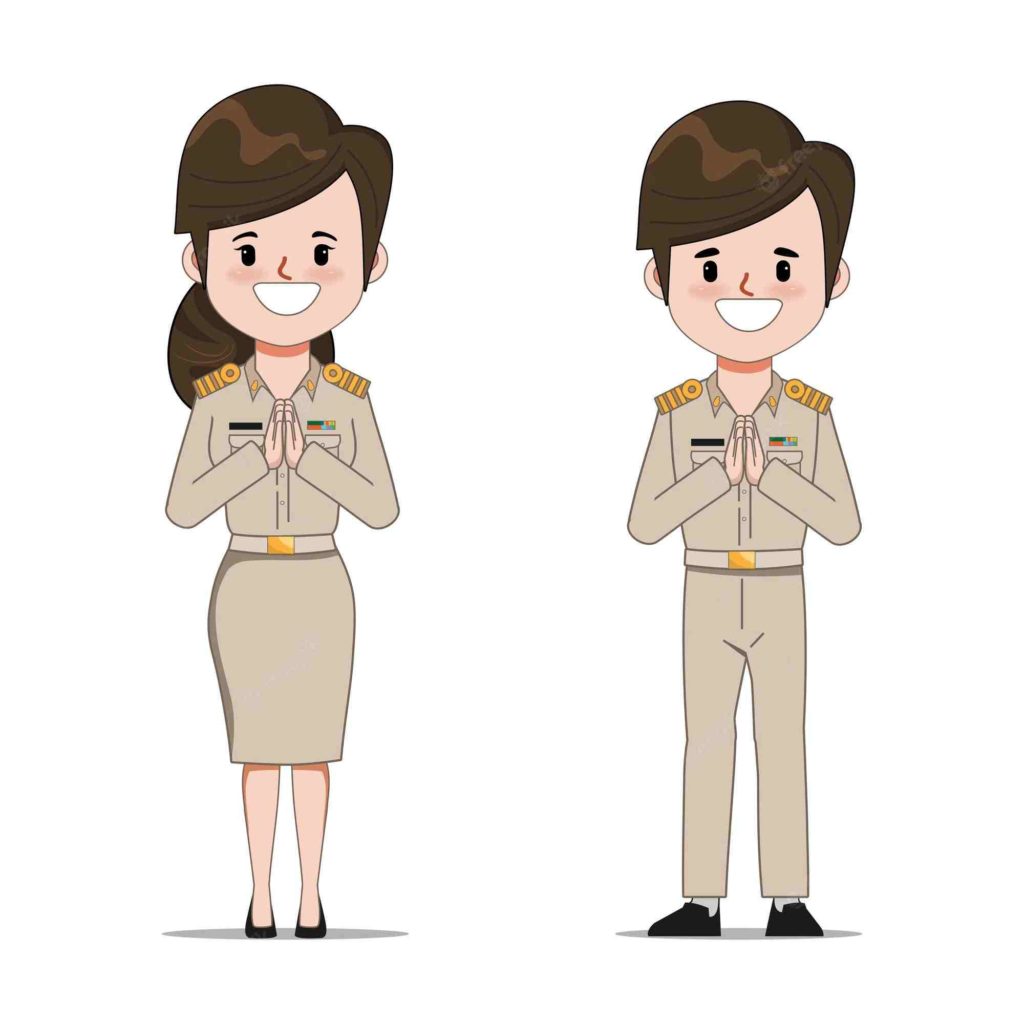In Thailand, the common greeting between teachers and students is a light, formal salute called the obat. This traditional salutation has been passed down as an important value in Thai culture. When you see a Thais raise their hand to palm level with their shoulder and wave it back and forth while saying obat, they are demonstrating their respect for elders and tradition. The obat can be given to any adult or older child as a sign of respect and gratitude. To say thank you or good morning with the obat, raise your hand palm up from your hip toward your shoulder then wave it back and forth three times. Let’s see how Thai teacher greeting students.
How to do the Thai Teacher Greeting
To salute a teacher, stand in front of the older person and raise your hand palm up from your hip toward your shoulder then wave it back and forth three times. This is an example of the May Pen Obat, which is the more formal version of the greeting.
Thai Students’ Greeting: The Art of the Obat
If you want to show respect for the younger generation in Thailand, you can use the obat as a greeting. This is especially important for female teachers who are likely to be addressed by their students as “Mee” or “Miss.”
Instead of the May Pen Obat, you can use the informal greeting “Gur-Ao-Oo” to greet teenage students. The word Gur-Ao-Oo means “Hello” and can be pronounced “goo-roo-oh.” You can use Gur-Ao-Oo to greet younger students in Thailand, but you can also use it to say “thank you” or “good morning” to Thai teachers. If you’re a Thai teacher, Gur-Ao-Oo can also be used to acknowledge a teacher’s presence in the classroom.
The History of the Thai Teacher Salute
The obat has been used as a customary greeting in Thailand since the era of the Buddha. The word “obat” means “salutation” and is derived from the Sanskrit word “upavesa,” which means to pay respect. In Buddhist tradition, the obat is a formal gesture used between teachers and students. The obat is considered a sacred act and is not intended to be used lightly.
Why is the Thai Teacher Greeting Important?
In Thailand, the common greeting between teachers and students is a light, formal salute called the obat. This traditional salutation has been passed down as an important value in Thai culture. When you see a Thais raise their hand to palm level with their shoulder and wave it back and forth while saying obat, they are demonstrating their respect for elders and tradition.
The obat can be given to any adult or older child as a sign of respect and gratitude. To say thank you or good morning with the obat, raise your hand palm up from your hip toward your shoulder then wave it back and forth three times.
Examples of the Thai Teacher Salute in Practice
If you want to show respect for the younger generation in Thailand, you can use the obat as a greeting. This is especially important for female teachers who are likely to be addressed by their students as “Mee” or “Miss.”
Instead of the May Pen Obat, you can use the informal greeting “Gur-Ao-Oo” to greet teenage students. The word Gur-Ao-Oo means “Hello” and can be pronounced “goo-roo-oh.” You can use Gur-Ao-Oo to greet younger students in Thailand, but you can also use it to say “thank you” or “good morning” to Thai teachers. If you’re a Thai teacher, Gur-Ao-Oo can also be used to acknowledge a teacher’s presence in the classroom.
The Obat in Context
The ancient Thai people believed that the universe was created by the power of the sun. The sun is equated with the supreme deity of the Thai religion, so it’s not surprising that the obat is used in a ritual of sun worship.
Like many Asian cultures, the Thai people believe that connecting with the sun is the way to achieve good health and happiness. One way to connect with the sun is to burn incense and make offerings to the fire. Ancient Thai people believed that the fire in their homes helped them to connect with the sun. Therefore, the obat, which is a salute to the fire, is also connected with the sun.
Conclusion
When you see a Thais raise their hand to palm level with their shoulder and wave it back and forth while saying obat, they are demonstrating their respect for elders and tradition. The obat can be given to any adult or older child as a sign of respect and gratitude. To say thank you or good morning with the obat, raise your hand palm up from your hip toward your shoulder then wave it back and forth three times.
When you want to show respect for the younger generation in Thailand, you can use the obat as a greeting. This is especially important for female teachers who are likely to be addressed by their students as “Mee” or “Miss.” Instead of the May Pen Obat, you can use the informal greeting “Gur-Ao-Oo” to greet teenage students. The word Gur-Ao-Oo means “Hello” and can be pronounced “goo-roo-oh.”
Other blogs about language!

